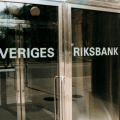Representatives of several central banks met at a one-day conference in Kyiv,organized by the National Bank of Ukraine (NBU) to discuss the concept of state cryptocurrencies.
The initiator of the one-day conference was the NBU,which in 2018 stated that it was considering the possibility of issuing a national electronic currency, and last summer issued a limited amount of its own cryptocurrency.
The central bank wanted to test their ideas andconclusions on the results of testing in the banking community and stimulate discussion, said the head of the Department of Innovative Development of the Central Bank of Ukraine Roman Hartinger. The conference was attended by representatives of the central banks of Canada, Sweden, Japan, Lithuania, Finland, the Netherlands, Belarus, Uruguay and South Africa.
As it became known at the conference, NBUsuspended the experiment with its own cryptocurrency. Now the Central Bank expects additional information from the banking community and updates on the regulation of digital assets in Ukraine. Although there are already some bills and concepts being considered by the authorities, formal laws have not yet been adopted.
At the conference, representatives of the central banks of the Netherlands and Canada were quite skeptical about distributed ledger technology.
“The essence of the DLT infrastructure is that neitherone side should not be trusted enough, but don’t we trust the central bank to maintain the integrity of the global distributed registry? ”said Harro Boven, legislative adviser in the payment policy department of the Central Bank of the Netherlands.
Senior director of fintech at the BankIn Canada, Scott Hendry, who was responsible for testing the Jasper project on the Corda platform, said "DLT is not needed to create a digital currency for the central bank."
"If you look at the DLT system and the current efficient centralized system for the sole purpose of interbank payments, blockchain doesn't offer much of an advantage," Hendry said.
He added that the Bank of Canada has no plans.change in the complex of technologies currently used. None of the speakers ruled out the use of DLT for issuing government cryptocurrencies in principle, but no one was particularly enthusiastic about this technology.
During the event, Hartinger also pointed to the atypical competitive situation in which central banks found themselves:
"Central banks are seeing tech giants issuing stablecoins, like Libra, and they're seeingNow the question is who will have it.Is the prerogative of issuing money to the government or to private technology companies?"
Representative of one of the central banks,who attended the conference, shared his thoughts with CoinDesk, but asked not to be named. He said that Libra has become a catalyst for the process of studying the concept of state cryptocurrencies, the need for which is long overdue. However, he said he was not worried about competition from Facebook.
"People will want to use Libra if our monetary system doesn't perform well.Our best defense is to do our job," he said.
Despite general skepticism, not all central banks have given up onThe Central Bank of Sweden recently announced the start of testing its own cryptocurrency.E-krona is a kind of electronic money for everyday use, a toolfor payments between households, denominated in national currency and available 24/7, Bjorn Segendorf, senior policy adviser to the Central Bank of Sweden in the payments department, said at the event.
Segendorf said that Sweden's central bank will not test the technology because the organization is set up to use a blockchain-based solution.He said the key is to be prepared for a cashless future as young people rely less and less on cash.
</p></p>




